If you're struggling with sleeplessness, sleep-inducing herbal tea blends could be your solution. Ancient wisdom highlights herbs like chamomile and lavender for their calming effects, while valerian root promotes deeper sleep. Lemon balm and passionflower can reduce anxiety, creating a peaceful mindset. Blends featuring rooibos and ashwagandha aid in stress relief, and tulsi and licorice support respiratory health. Preparing your tea with warm water and steeping it just right helps signal your body to unwind. Incorporating these herbal blends into your nightly routine can work wonders for your sleep quality, and there's plenty more to explore.
Importance of Herbal Teas
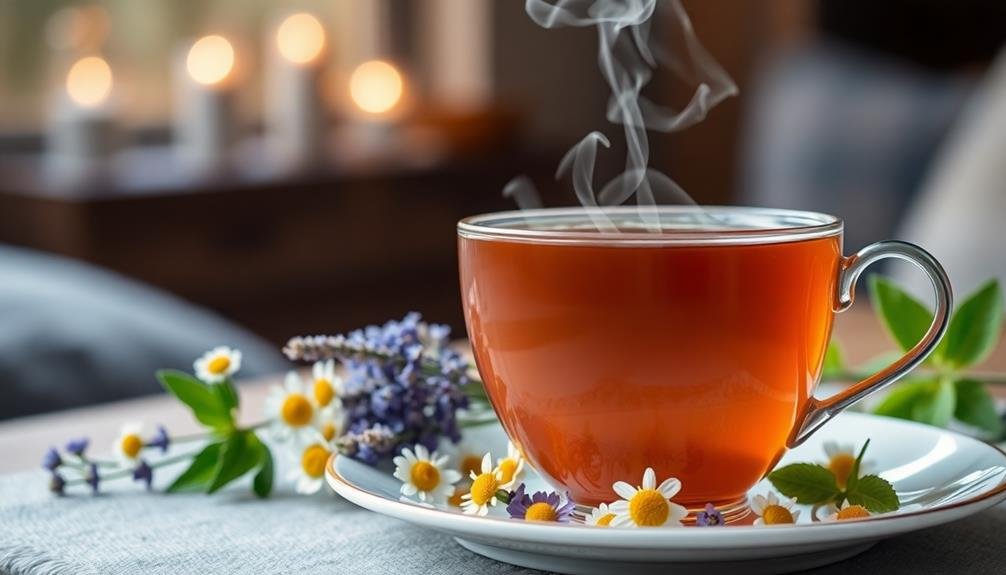
Herbal teas play an essential role in promoting overall well-being, especially when it comes to relaxation and sleep. When you sip on a warm cup of herbal tea, you're not just enjoying a comforting beverage; you're also embracing the natural properties that can help calm your mind and body. Many herbal blends contain ingredients like chamomile, valerian root, and lavender, all known for their soothing effects.
Drinking herbal tea before bedtime can signal your body that it's time to unwind, helping you shift into a restful state. The warmth of the tea can also elevate your comfort, making it an inviting ritual to end your day. Plus, these teas are caffeine-free, so you won't have to worry about jarring your nervous system.
Incorporating herbal teas into your nightly routine can set the stage for a peaceful night's sleep. The blend of flavors and aromas can create a sensory experience that promotes tranquility.
Common Insomnia Causes
If you're struggling with insomnia, stress and anxiety might be keeping you awake at night.
Your lifestyle choices and sleep habits can also play a significant role in how well you rest.
Identifying these common causes is the first step toward finding a solution that works for you.
Stress and Anxiety Factors
Stress and anxiety are significant culprits behind sleepless nights. When your mind races and worries flood in, drifting off to sleep becomes a challenge. You may find yourself tossing and turning, replaying the day's events or anticipating tomorrow's tasks.
Various stressors can contribute to this cycle of insomnia, and recognizing them is the first step toward regaining restful sleep.
Consider these common stress and anxiety factors:
- Work pressures: Deadlines and demanding projects can create a constant state of stress.
- Personal relationships: Conflicts or unresolved issues with friends or family can weigh heavily on your mind.
- Financial concerns: Worrying about bills and expenses often leads to restless nights.
- Health issues: Physical discomfort or chronic pain can exacerbate anxiety and disrupt sleep patterns.
Lifestyle and Sleep Habits
Your daily habits and lifestyle choices can profoundly impact your ability to get a good night's sleep. If you're consuming caffeine late in the day, it might be keeping you awake longer than you realize. Try to limit caffeine intake to the morning hours.
Also, consider your screen time; scrolling through your phone or watching TV right before bed can disrupt your body's natural sleep signals.
Establishing a regular sleep schedule is essential. Going to bed and waking up at the same time each day helps regulate your internal clock.
Additionally, your sleep environment matters. Make sure your bedroom is dark, cool, and quiet to create a conducive atmosphere for sleep.
Physical activity can also influence sleep quality. Regular exercise, ideally done earlier in the day, can help you fall asleep faster and enjoy deeper sleep.
Finally, be mindful of your evening routines. If you're rushing around or dealing with stressful tasks close to bedtime, it can lead to an anxious mind, making it harder to unwind.
Chamomile and Lavender Blend
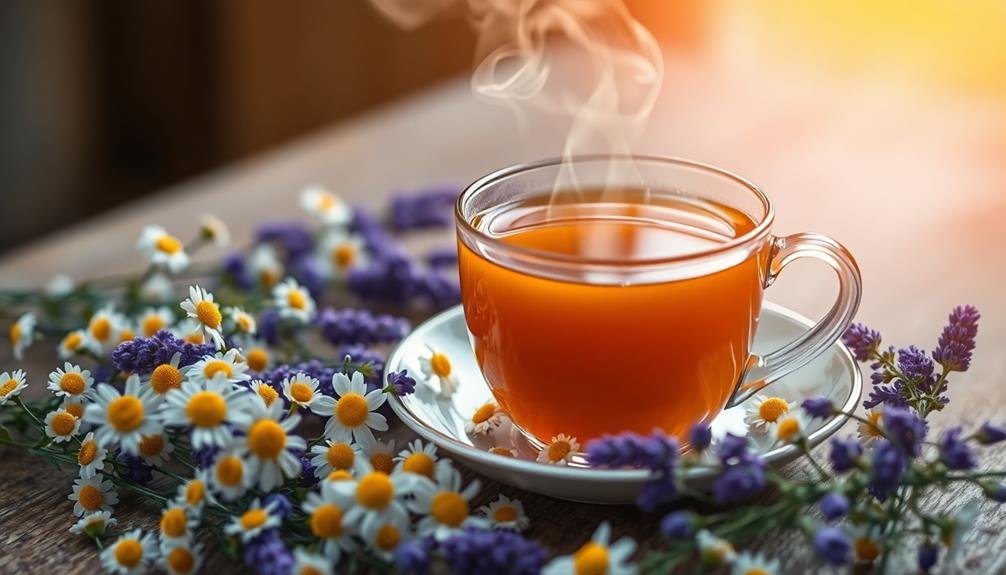
Infusing tranquility into your evening routine, the chamomile and lavender blend offers a soothing respite from the day's chaos. This delightful combination harnesses the calming properties of two well-known herbs, creating a perfect bedtime beverage that helps you unwind and relax.
Chamomile is renowned for its gentle sedative effects, while lavender adds a fragrant touch that further promotes restful sleep. Together, they create a harmonious blend that can ease your mind and prepare your body for slumber.
Here's what makes this blend so appealing:
- Calming aroma: Lavender's soothing scent can help reduce anxiety and improve mood.
- Gentle sedation: Chamomile helps to relax your muscles and calm your nerves.
- Anti-inflammatory properties: Both herbs can reduce inflammation, aiding overall health.
- Simple preparation: Just steep the blend in hot water, and you're ready to enjoy.
Incorporating this chamomile and lavender blend into your nightly ritual not only sets the stage for better sleep but also allows you to savor a moment of peace before drifting off.
Embrace this natural remedy, and let it guide you to a restful night.
Valerian Root and Lemon Balm
If you're looking for a natural way to enhance your sleep, valerian root and lemon balm might be the perfect duo for you.
Valerian root is known for its calming benefits, while lemon balm adds a revitalizing touch with its soothing properties.
Let's explore how to brew the ideal blend of these herbs for a restful night.
Benefits of Valerian Root
While many herbal remedies claim to promote relaxation, valerian root stands out for its proven ability to improve sleep quality.
If you're struggling with restless nights, incorporating valerian root into your routine might just be the solution you need. This powerful herb has been used for centuries to address sleep issues, and its benefits are well-documented.
Here are some key benefits of valerian root:
- Reduces sleep latency: It helps you fall asleep faster, making it easier to get the rest you need.
- Enhances sleep quality: Many users report deeper, more restorative sleep when using valerian root regularly.
- Alleviates anxiety: Its calming properties can help ease the mind, contributing to a more peaceful night's sleep.
- Non-habit forming: Unlike some sleep medications, valerian root is a natural option that doesn't lead to dependence.
Properties of Lemon Balm
Lemon balm, with its soothing lemon fragrance, complements valerian root beautifully in herbal tea blends aimed at promoting sleep. This herb, known for its calming properties, can help ease anxiety and reduce stress, making it a perfect addition to your nighttime routine.
When you sip on lemon balm tea, you might notice a gentle wave of relaxation wash over you, allowing your mind to unwind after a long day. Rich in compounds like rosmarinic acid, lemon balm not only promotes calmness but also enhances the overall quality of your sleep.
Many studies suggest that it can improve sleep efficiency, helping you drift off faster and stay asleep longer. Its mild sedative effects make it particularly appealing for those who struggle with insomnia or restless nights.
Additionally, lemon balm's pleasant flavor adds a revitalizing twist to your herbal tea blends, making the experience more enjoyable. You'll find that its ability to uplift your mood can be just as beneficial as its calming effects, striking a balance that prepares you for a peaceful night's rest.
Try incorporating lemon balm into your herbal tea blends, and you might discover a new favorite for serene slumber.
Brewing the Perfect Blend
How can you brew the perfect herbal tea blend of valerian root and lemon balm for a restful night? Start by gathering your ingredients and tools. You'll want to create a soothing mixture that combines the calming properties of both herbs. Here's how to do it:
- Use dried herbs: Choose high-quality valerian root and lemon balm to maximize their soothing effects.
- Measure your ratios: A common blend is one part valerian root to two parts lemon balm, but feel free to adjust based on your taste preferences.
- Boil water: Bring fresh, filtered water to a rolling boil for ideal extraction of flavors and benefits.
- Steep properly: Pour the boiling water over your herbs and let them steep for 10-15 minutes. This allows the active compounds to infuse into the water.
Once steeped, strain the tea into your favorite mug and enjoy! You can sweeten it with honey or add a slice of lemon for extra flavor.
Sip your herbal tea blend about an hour before bedtime, and let the calming effects lull you into a restful slumber. Sweet dreams await!
Passionflower and Hops Combination
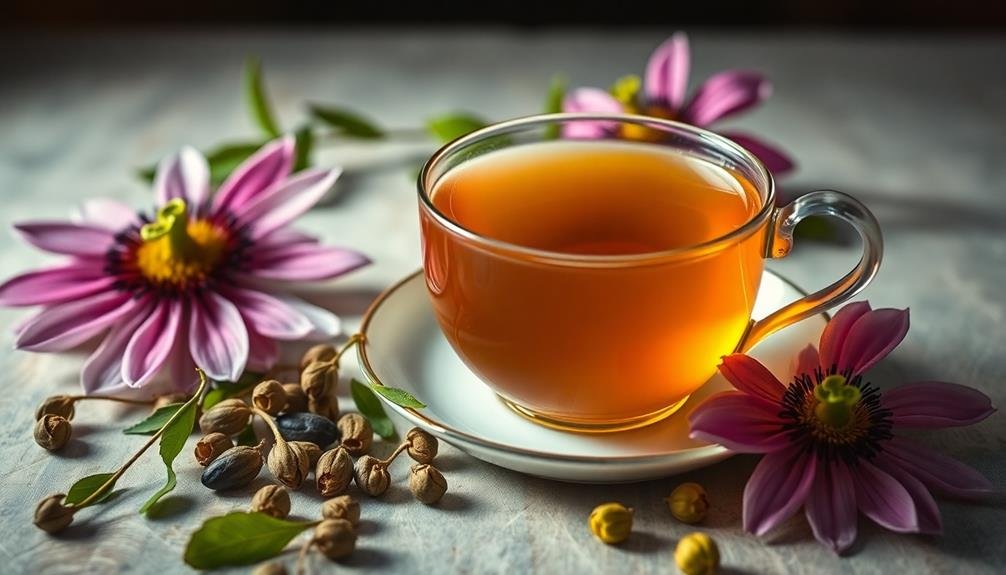
If you're looking to unwind and drift off to sleep more easily, the combination of passionflower and hops might just be your perfect solution. Both herbs have been cherished for centuries, known for their calming effects.
Passionflower, with its delicate blooms, has been shown to reduce anxiety and improve sleep quality. It works by increasing levels of gamma-aminobutyric acid (GABA) in your brain, helping to soothe your mind.
Hops, commonly recognized for their role in brewing beer, offer more than just a revitalizing flavor. They're renowned for their sedative properties and can enhance the effectiveness of other sleep-inducing herbs.
When combined with passionflower, hops amplify the overall calming effect, making it easier for you to relax and prepare for a restful night.
To enjoy this blend, steep dried passionflower and hops in hot water for about 10 minutes. You might want to add a touch of honey or lemon to enhance the flavor.
Sip this herbal tea about an hour before bedtime, and let the soothing aroma and gentle flavors guide you toward a peaceful slumber. You'll likely wake up feeling invigorated and rejuvenated, ready to take on the day.
Peppermint and Ginger Mix
When you're looking for a calming herbal tea, consider a peppermint and ginger mix.
Peppermint's invigorating flavor can help clear your mind, while ginger's soothing properties may ease tension in your body.
Together, they create a comforting blend that supports relaxation and promotes better sleep.
Benefits of Peppermint
Enjoying a soothing cup of peppermint and ginger tea can be a delightful way to unwind and promote better sleep. Peppermint brings a unique set of benefits that can enhance your overall well-being, especially when combined with ginger.
Here's how peppermint can work wonders for you:
- Aids Digestion: Peppermint relaxes your digestive muscles, helping alleviate discomfort and bloating, making it easier for you to relax before bed.
- Relieves Stress: The rejuvenating aroma of peppermint can help reduce stress and anxiety levels, creating a calming atmosphere conducive to sleep.
- Improves Respiratory Function: If you've got a stuffy nose or allergies, peppermint's menthol content can open up your airways, making it easier to breathe and promoting restful sleep.
- Boosts Mood: The invigorating scent of peppermint can elevate your mood, helping to chase away any lingering worries that might keep you awake.
Incorporating peppermint into your evening routine, especially when combined with ginger, not only helps you unwind but also sets the stage for a better night's sleep.
Ginger's Soothing Properties
Ginger complements peppermint beautifully, adding its own soothing properties that can enhance your nighttime routine. When you combine these two herbs, you create a tea that not only tastes delightful but also promotes relaxation and peace of mind. Ginger's warm and spicy essence can help ease tension and calm your mind, making it easier for you to unwind after a long day.
Here's a quick overview of what each ingredient brings to the table:
| Ingredient | Soothing Benefits |
|---|---|
| Ginger | Reduces nausea and promotes digestion, easing discomfort. |
| Peppermint | Relieves headaches and clears sinuses, enhancing relaxation. |
| Together | Encourages a restful sleep environment, calming your senses. |
| Perfect Blend | Harmonizes body and mind, creating a serene pre-sleep ritual. |
Brewing a cup of peppermint and ginger tea not only warms you up but also sets a tranquil atmosphere for sleep. This herbal combination can help you drift into a restful slumber, leaving you refreshed for the day ahead. Embrace the soothing power of ginger and peppermint, and let their calming properties work their magic tonight.
Rooibos and Ashwagandha Tea
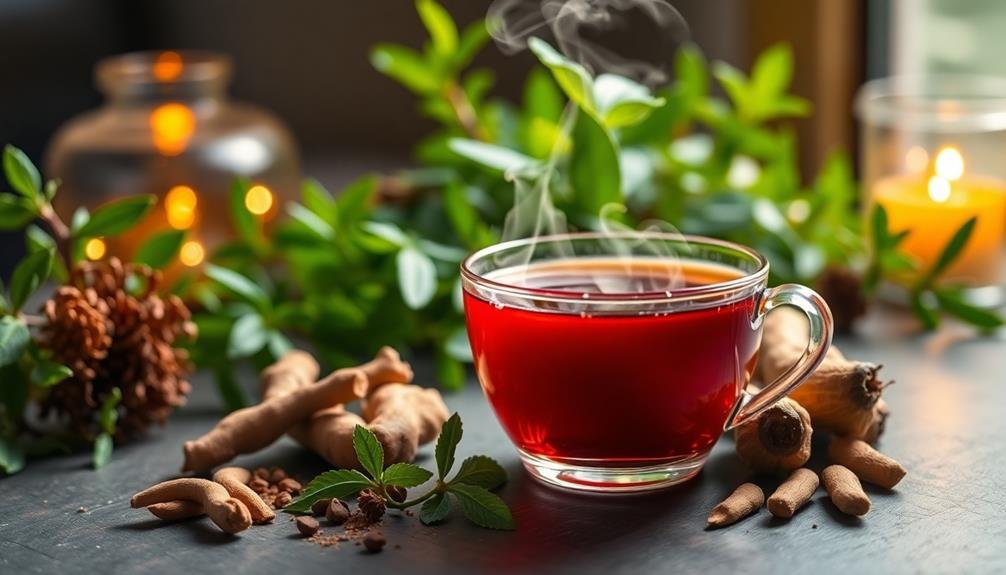
Rooibos and ashwagandha tea brings together two powerful herbs known for their calming properties, making it an excellent choice for those seeking a restful night's sleep.
Rooibos, a naturally caffeine-free herbal tea from South Africa, is rich in antioxidants, promoting overall well-being. Ashwagandha, an adaptogenic herb, helps manage stress and anxiety, allowing you to unwind at the end of the day.
When you brew a cup of rooibos and ashwagandha tea, you'll experience a harmonious blend of flavors and benefits.
Here's what you can expect:
- Stress relief: Ashwagandha helps reduce cortisol levels, easing your mind.
- Antioxidant support: Rooibos contains powerful antioxidants that combat oxidative stress.
- Sleep enhancement: The combination of these herbs promotes relaxation and prepares your body for sleep.
- Digestive aid: Rooibos can soothe your digestive system, making it easier to relax.
Incorporating this tea into your nightly routine can create a calming ritual that signals your body it's time to wind down.
Tulsi and Licorice Blend
A warm cup of tulsi and licorice blend can be a soothing ritual before bedtime. This delightful combination not only tastes great but also offers numerous benefits that promote relaxation.
Tulsi, often referred to as holy basil, is renowned for its adaptogenic properties. It helps your body manage stress and anxiety, creating a calm atmosphere conducive to sleep.
Licorice root complements tulsi beautifully, adding a natural sweetness while supporting your respiratory health. It can soothe your throat, making it easier to drift off without irritation. Together, these herbs create a gentle yet effective blend that encourages a peaceful mindset.
As you sip your tulsi and licorice tea, you'll likely notice a warming sensation that wraps around you, easing tension in both your body and mind. This blend serves as a gentle reminder to unwind and let your worries fade away.
Incorporating this tea into your nighttime routine can lead to improved sleep quality, helping you wake up refreshed and ready to tackle the day.
Preparing Your Herbal Tea
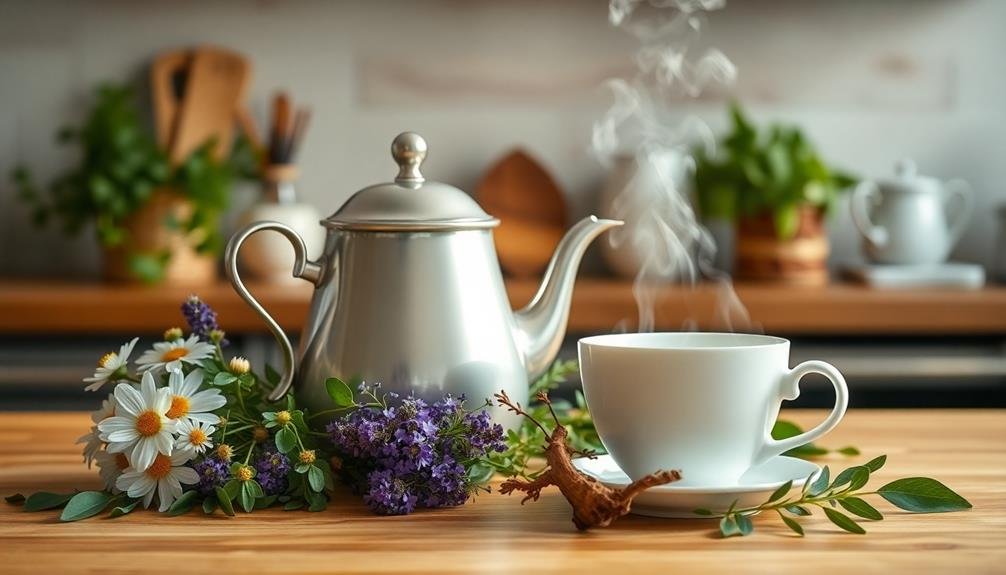
When you're ready to brew your herbal tea, start by gathering your ingredients and tools. A little preparation can go a long way in ensuring a delightful experience. Here's what you'll need:
- Your chosen herbal blend
- Fresh, filtered water
- A teapot or infuser
- A mug for sipping
Once you've got everything together, begin by boiling your filtered water. Aim for a temperature of about 200°F (just below boiling) for ideal extraction.
While the water heats, measure out your herbal blend—typically, one tablespoon per cup is best.
When the water reaches the right temperature, pour it over the herbs in your teapot or infuser. Allow it to steep for about 5 to 10 minutes, depending on your taste preference. The longer you steep, the stronger the flavor and benefits.
After steeping, remove the herbs and pour your tea into a mug. You can enjoy it plain or add a touch of honey or lemon if you like.
Take a moment to savor the aroma and warmth, as it sets the mood for relaxation. Enjoy your homemade herbal remedy!
Tips for Better Sleep
Getting a good night's sleep is essential for your overall well-being, and there are several effective strategies you can adopt.
First, establish a consistent sleep schedule by going to bed and waking up at the same time every day. This helps regulate your body's internal clock, making it easier to fall asleep and wake up refreshed.
Next, create a calming bedtime routine. Activities like reading a book, gentle stretching, or sipping a cup of herbal tea can signal your body that it's time to wind down.
Limit screen time at least an hour before bed, as the blue light emitted by devices can interfere with melatonin production.
Make your sleep environment conducive to rest. Keep your bedroom dark, cool, and quiet. Consider blackout curtains, earplugs, or a white noise machine if needed.
Also, be mindful of your diet; avoid heavy meals, caffeine, and alcohol close to bedtime.
Lastly, if you find yourself restless, don't stress about it. Get up, engage in a quiet activity until you feel sleepy again.
Frequently Asked Questions
Are There Any Side Effects of Herbal Sleep Teas?
Yes, herbal sleep teas can cause side effects like drowsiness, digestive issues, or allergic reactions. It's important to monitor your body's response and consult a healthcare professional if you experience any adverse effects.
How Long Before Bedtime Should I Drink Herbal Tea?
You should drink herbal tea about 30 to 60 minutes before bedtime. This timing allows your body to relax and absorb the calming effects, helping you unwind and prepare for a restful night's sleep.
Can I Combine Different Herbal Tea Blends?
Absolutely, you can combine different herbal tea blends! Just make certain the herbs complement each other and suit your taste. Experiment with flavors and effects, but start with small amounts to find your perfect blend.
Are Herbal Teas Safe for Children and Pregnant Women?
Herbal teas can be safe for children and pregnant women, but it's essential to consult a healthcare professional first. Some herbs might cause adverse effects, so always check for specific ingredients before serving.
What Are the Best Storage Practices for Herbal Teas?
To store herbal teas effectively, keep them in a cool, dark place in airtight containers. Avoid moisture and direct sunlight, as these can degrade flavor and potency. Regularly check for freshness to guarantee peak quality.
In Summary
Incorporating sleep-inducing herbal tea blends into your evening routine can be a soothing way to tackle insomnia. Each blend, from chamomile and lavender to tulsi and licorice, offers unique benefits that can help calm your mind and promote restful sleep. By preparing your tea mindfully and embracing a few sleep tips, you can create a peaceful bedtime ritual. So grab your favorite blend, sip slowly, and let the ancient wisdom of herbs guide you to a more restful night.

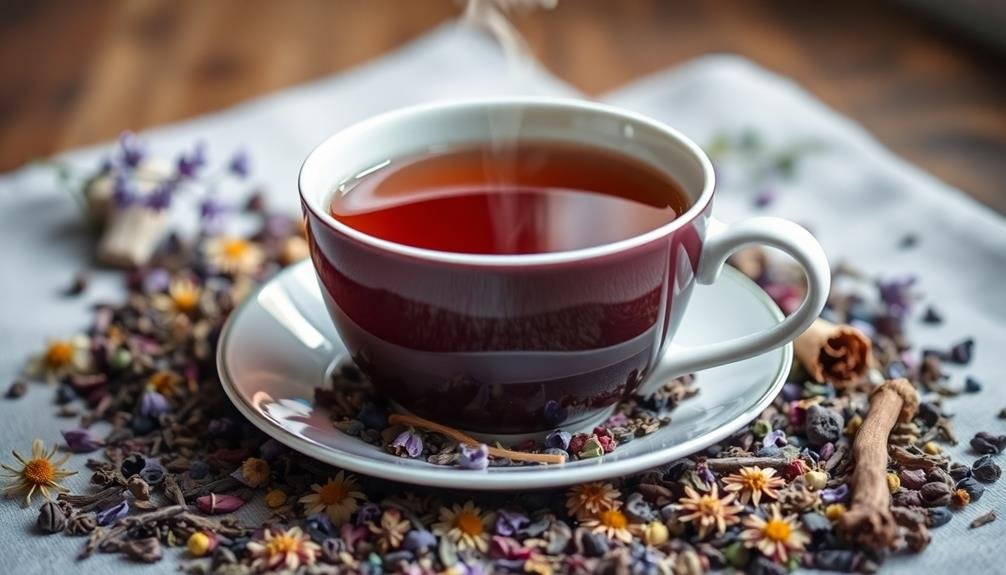
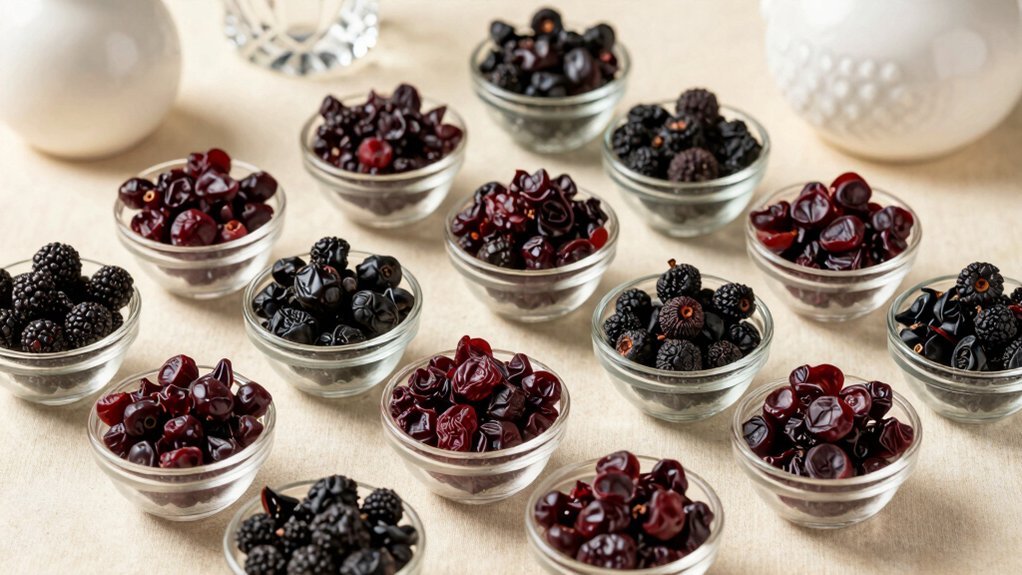
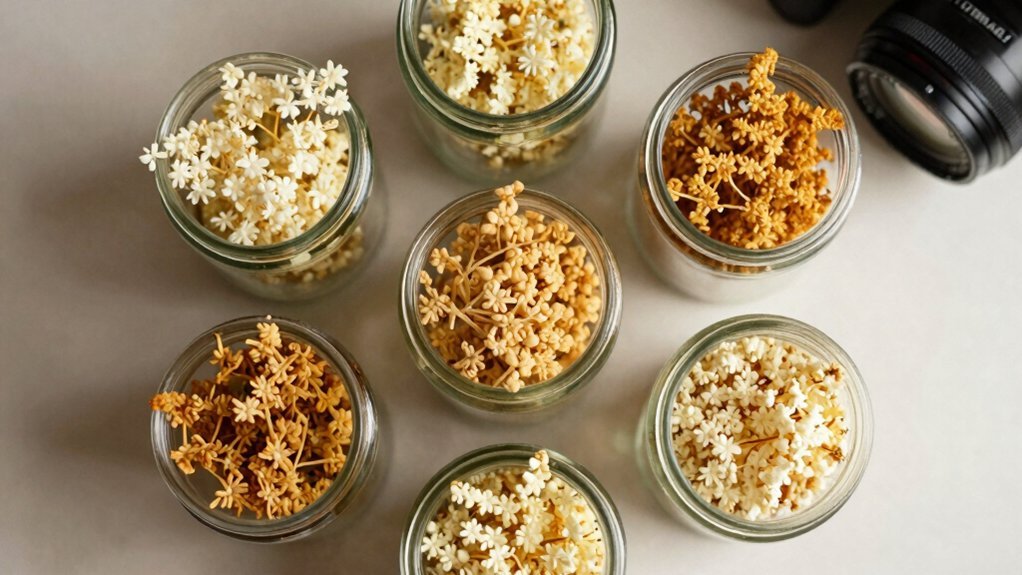

Leave a Reply